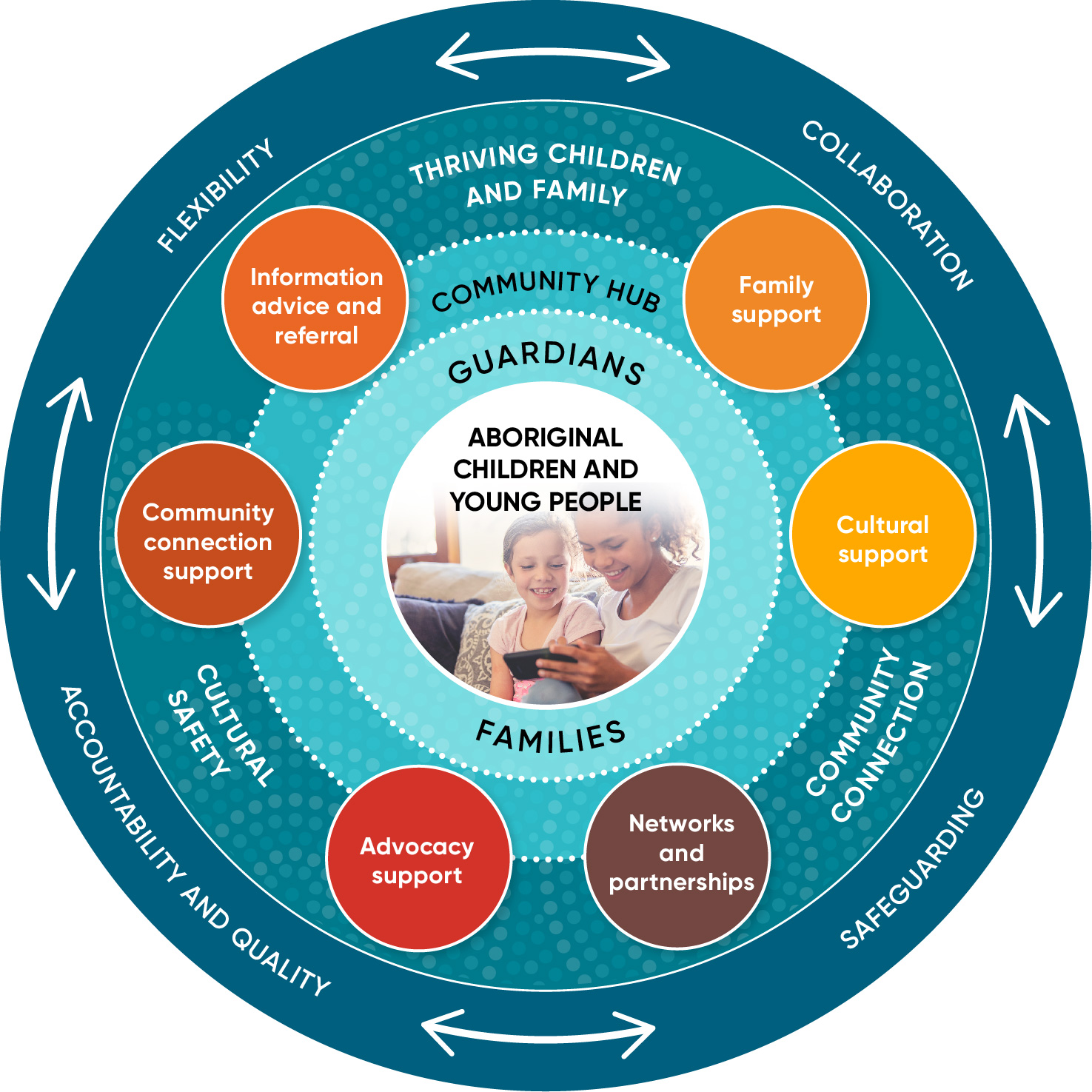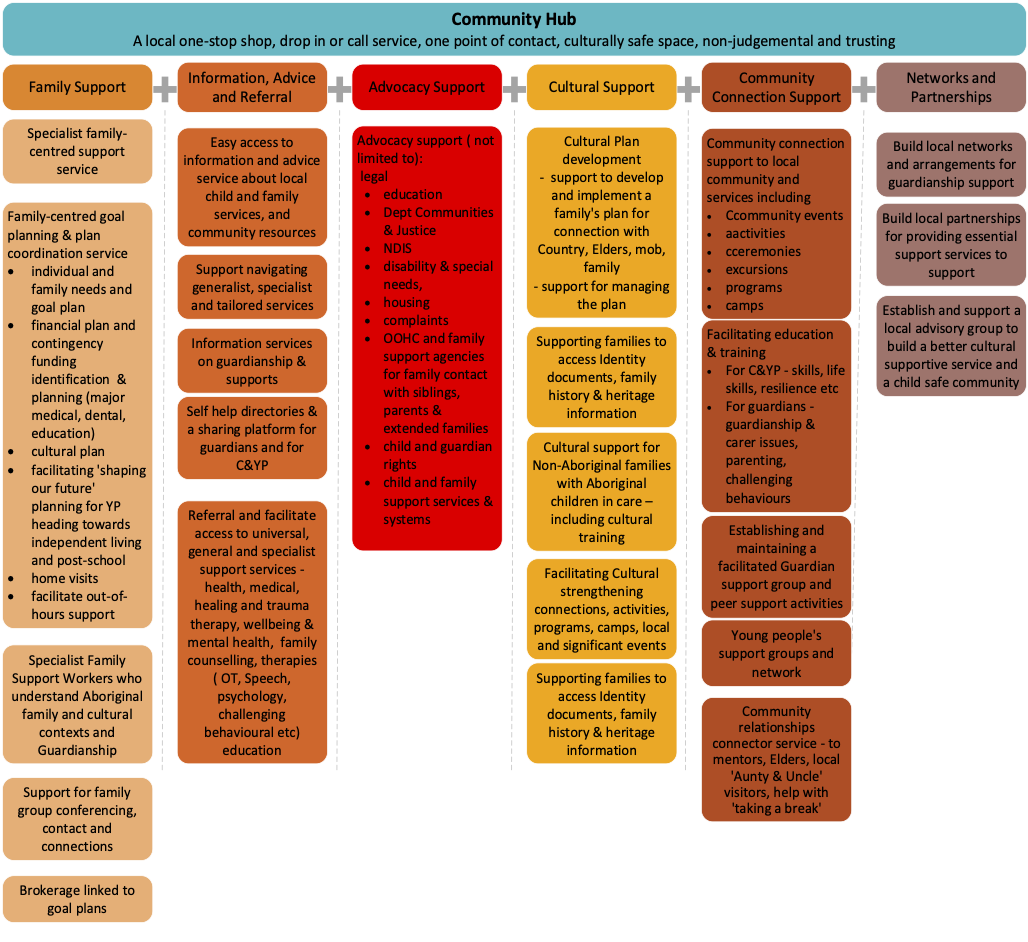Aboriginal Guardianship Support Model
Early intervention and holistic family support should always be the first port of call.
Strengthening our families through the Aboriginal Guardianship Support Model
AbSec is committed to improving outcomes for Aboriginal children and young people on guardianship orders through the Aboriginal Guardianship Support Model. This innovative model has been co-designed with guardians, carers, community members, service practitioners, and government partners to ensure it meets the specific needs of Aboriginal families.
In 2020, AbSec initiated a co-design process to address the challenges faced by families following the shift to guardianship orders. This process involved extensive engagement with Aboriginal communities, the Department of Communities and Justice, and other key stakeholders. The result is a support model that provides a network of services, supports, and resources delivered by Aboriginal Community Controlled Organisations (ACCOs). This ensures that Aboriginal children on guardianship orders have access to the supports they and their families need to thrive.
The Aboriginal Guardianship Support Model was trialled in the Hunter and South West Sydney regions from January 2022 through December 2023. During this period, the model was evaluated for potential expansion to other areas.
Our commitment
AbSec continues to advocate for an effective support model for Aboriginal children and young people on guardianship orders while maintaining its opposition to permanent care orders.
We believe such orders do not adequately safeguard Aboriginal children’s rights to safety, family, community, culture, and ongoing support.
Support for those on guardianship orders
Aboriginal children and young people on guardianship orders, along with their guardians, can access support from local service providers. Two Aboriginal community-controlled service providers have been commissioned by AbSec to deliver the model, both looking forward to welcoming children, young people, guardians and their families and are always happy to have a yarn.
The Aboriginal Guardianship Support Model
Click each image to view the components of the Aboriginal Guardianship Support Model.
In the design of the model, AbSec spoke with people who have been affected by the transition to guardianship orders, particularly those living in the Hunter and South West Sydney areas, as guardians have not been eligible for ongoing assistance and support from the Department of Communities and Justice or an out-of-home care agency to help them meet the long-term needs of a child or young person with a guardianship order.
The process involved:
- Needs assessment: Identifying social needs and prioritizing them.
- Co-design of supports: Combining lived experience and professional expertise to create effective supports within budget constraints.
- Design of procurement: Engaging providers to deliver the co-designed services.
- Reviewing the approach: Learning from experience to improve the model.
The core service components, which are outlined in the image above, were identified by collaborators as important and comparable in both trial locations, mainly because families across the districts had experienced similar circumstances in transitioning to guardianship.
The complexities of each potential service user’s circumstances, however, are unique and individual. Therefore assistance will need to be tailored and not ‘one size fits all’. Service users also articulated there should be a ‘no wrong door’ approach to in-service support.
Information on the development of the AGSM
Aboriginal Guardianship Support Model Background
Interviews with guardians that gathered insights and advice on services and supports for Aboriginal children with guardianship orders.
Working towards a final design for guardianship support
Past workshops focused on creating ideas and opportunities around identified areas of support, and canvassing the views of guardians, carers and their supporters across a range of key areas.
AGSM Provider Specifications, July 2021
Specifications for service providers to deliver the Aboriginal Guardianship Support Model in the Hunter and South West Sydney.
AGSM Brokerage Guidelines
Included as part of the ASGM trial project, supporting a child, young person or their guardians to set and achieve goals in the absence of a Financial and Cultural Plan for guardianship contingency support.
Insights on Guardianship in the Hunter, July 2020
Insights on the guardianship of Aboriginal children and young people, and their guardians and carers, in the Hunter district.
Insights on Guardianship in South Western Sydney, July 2020
Insights on the guardianship of Aboriginal children and young people, and their guardians and carers, in the South Western Sydney district.




